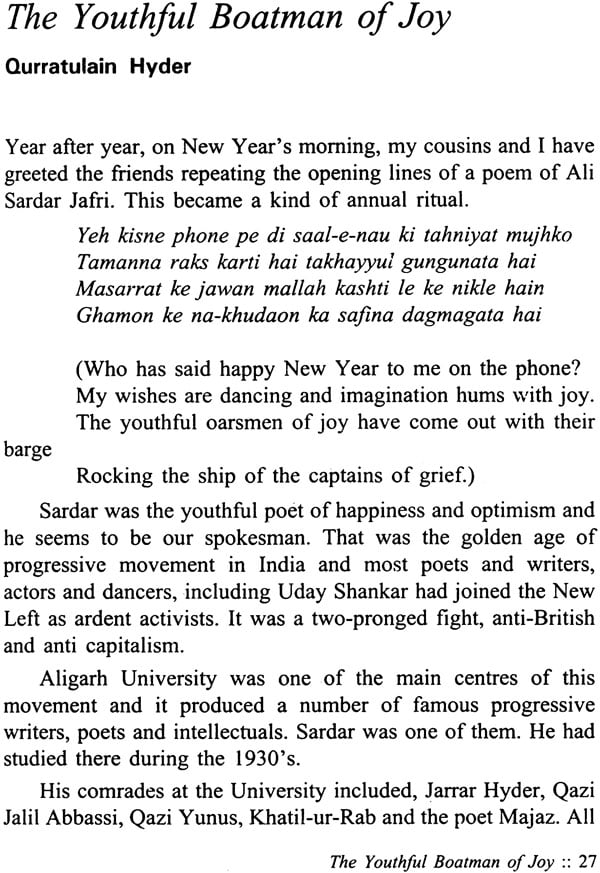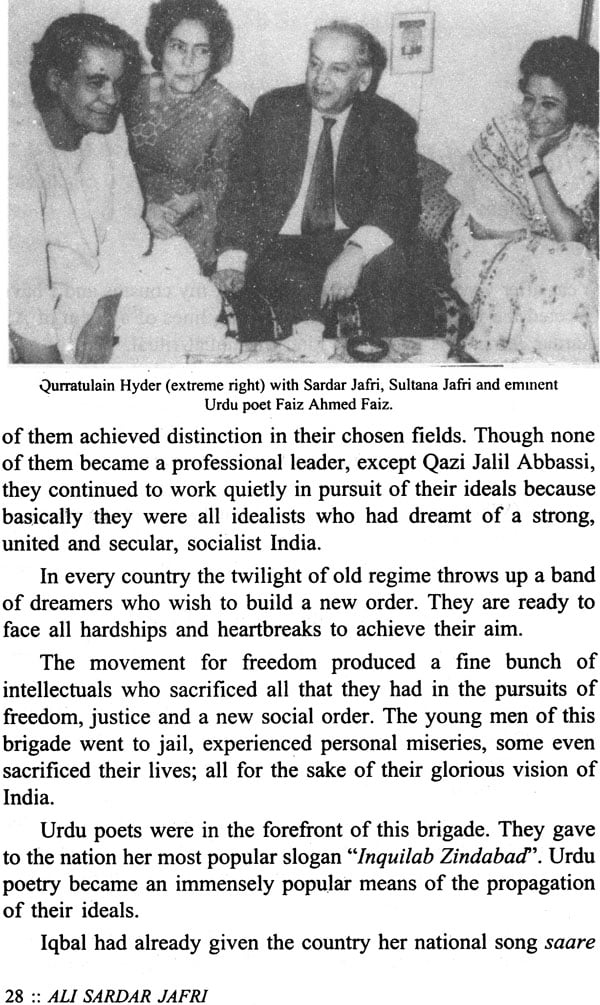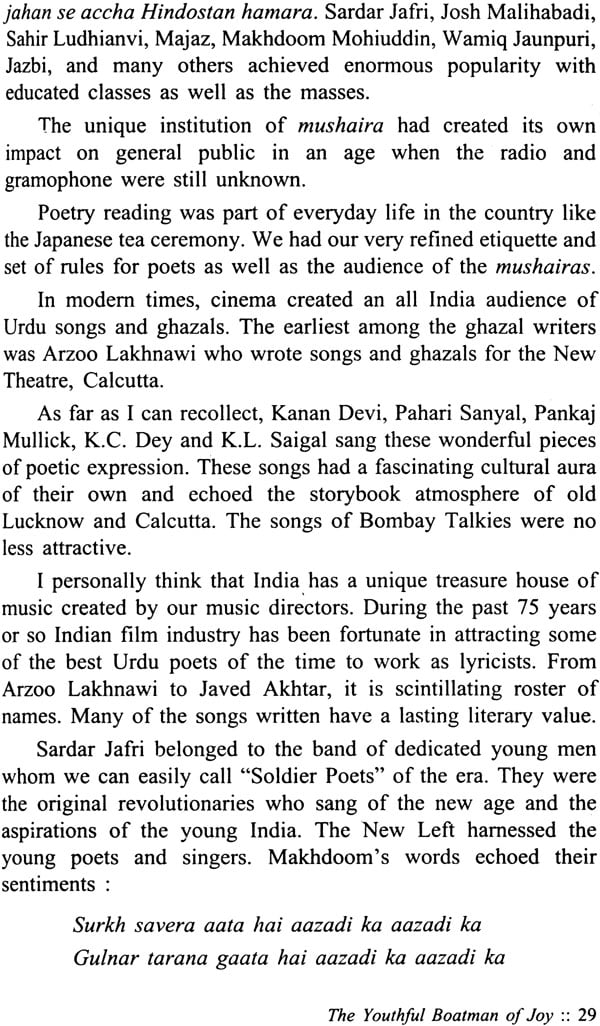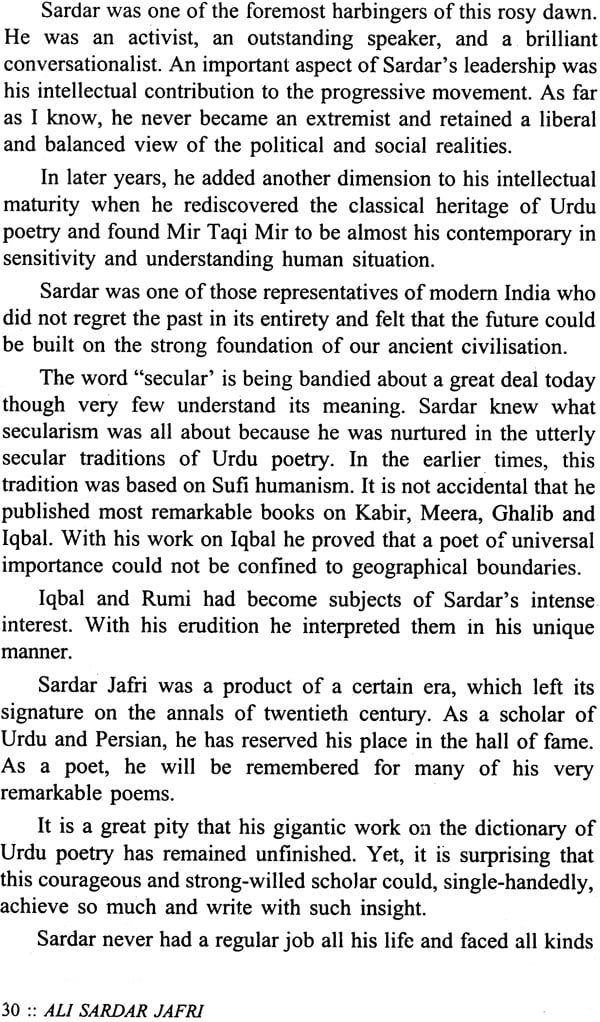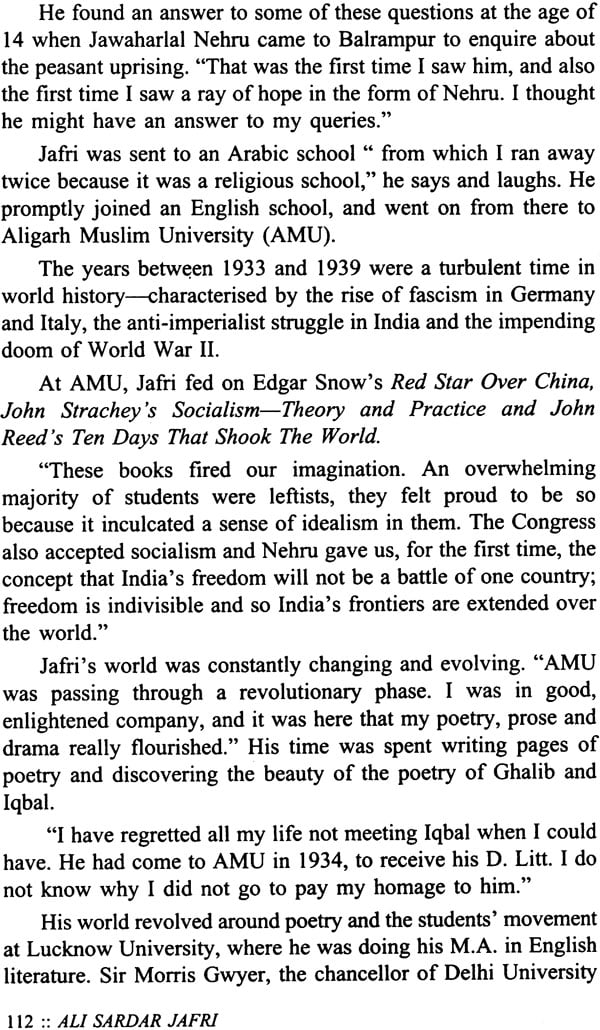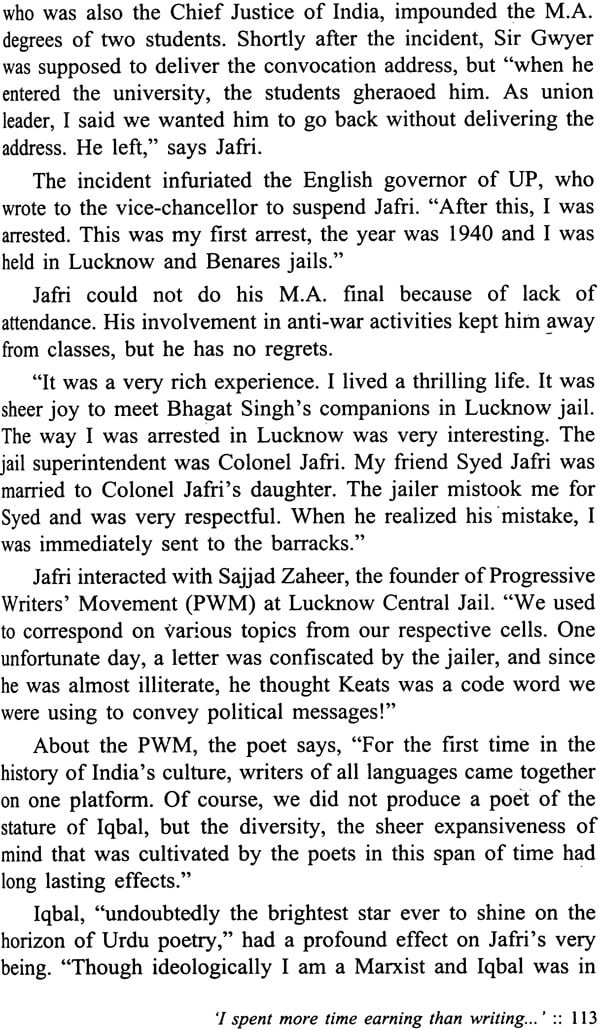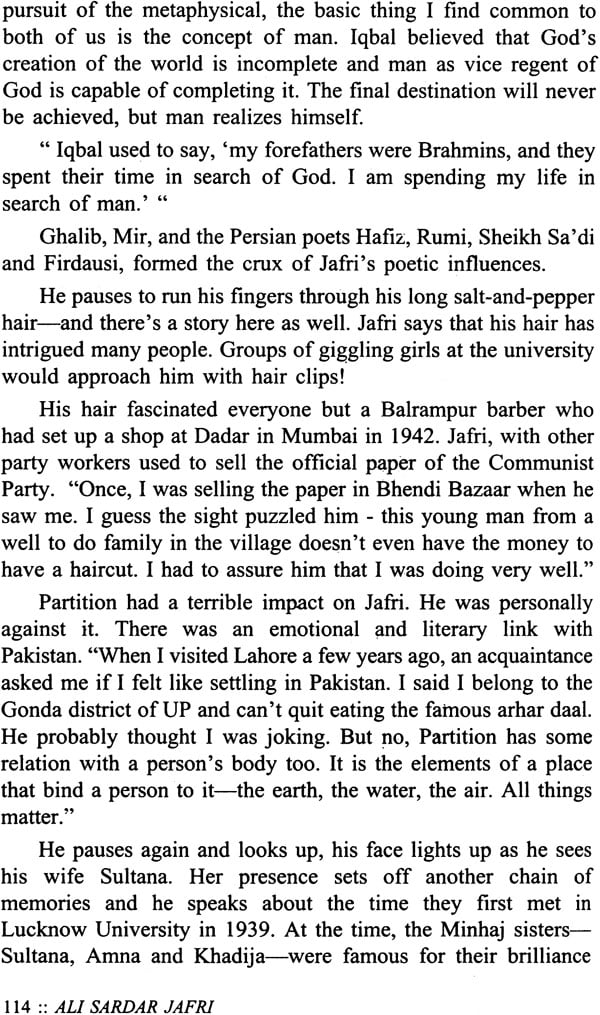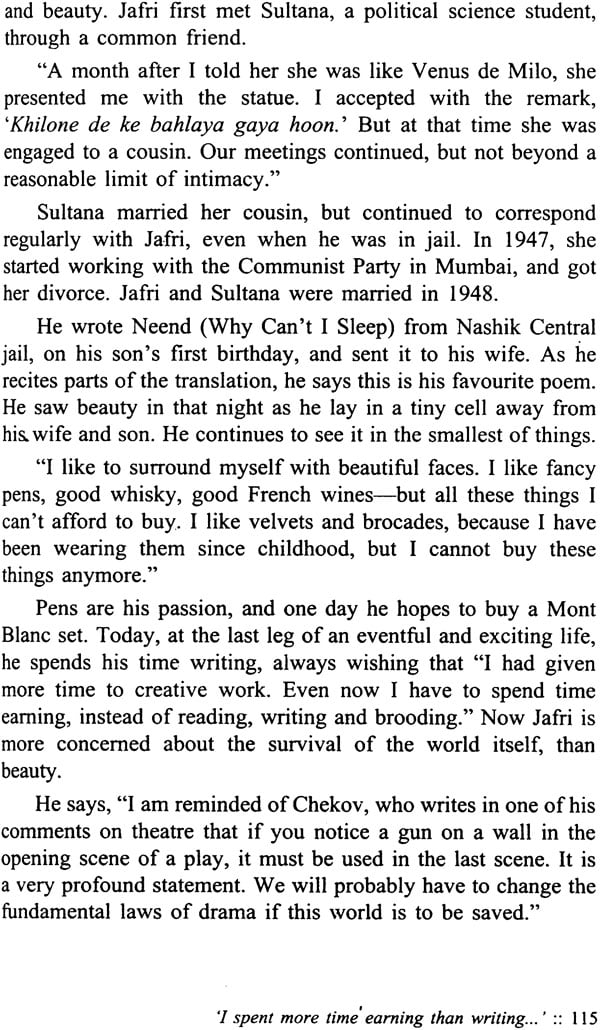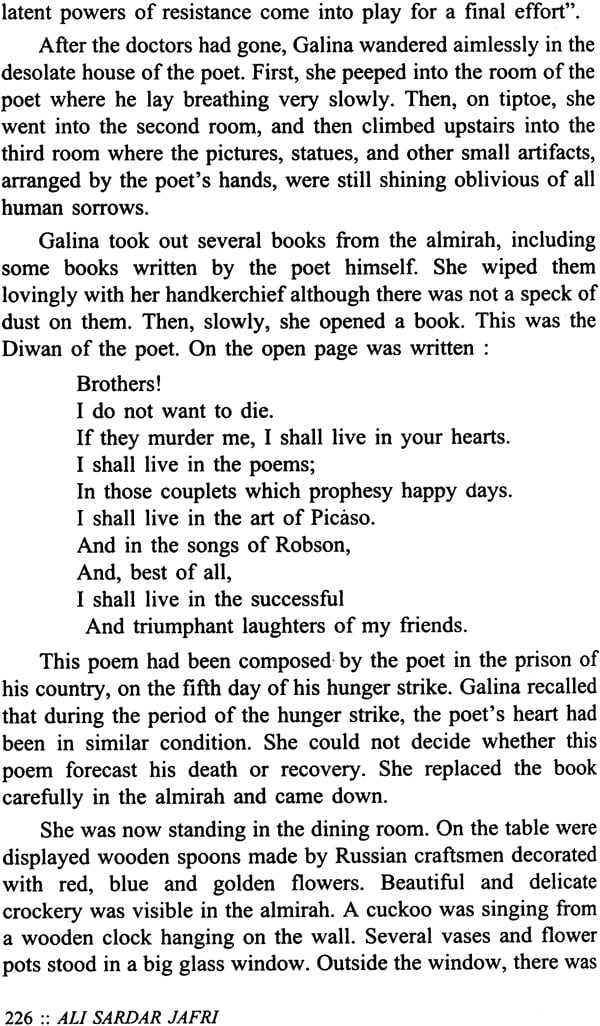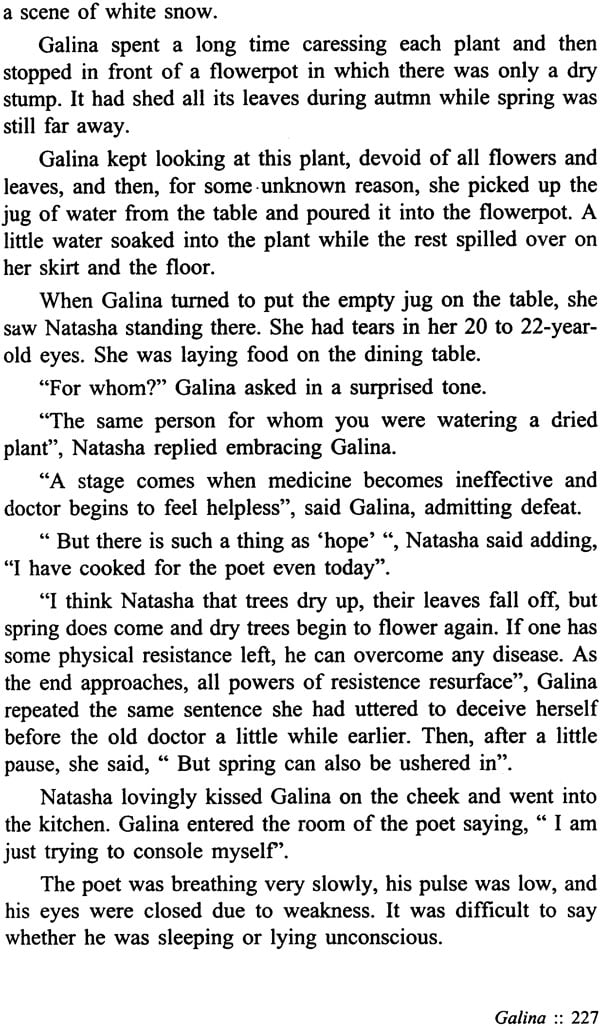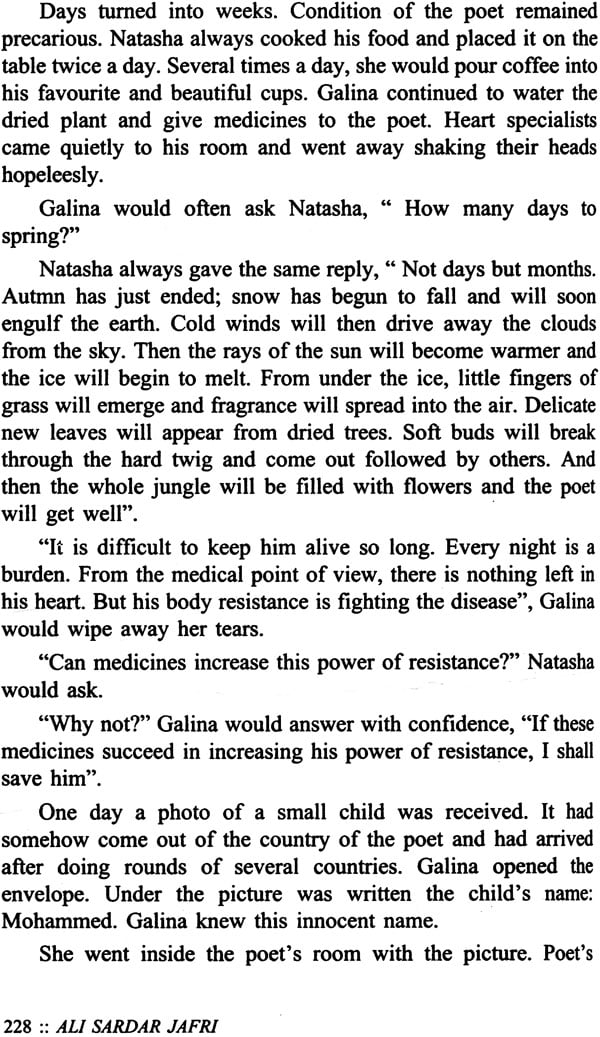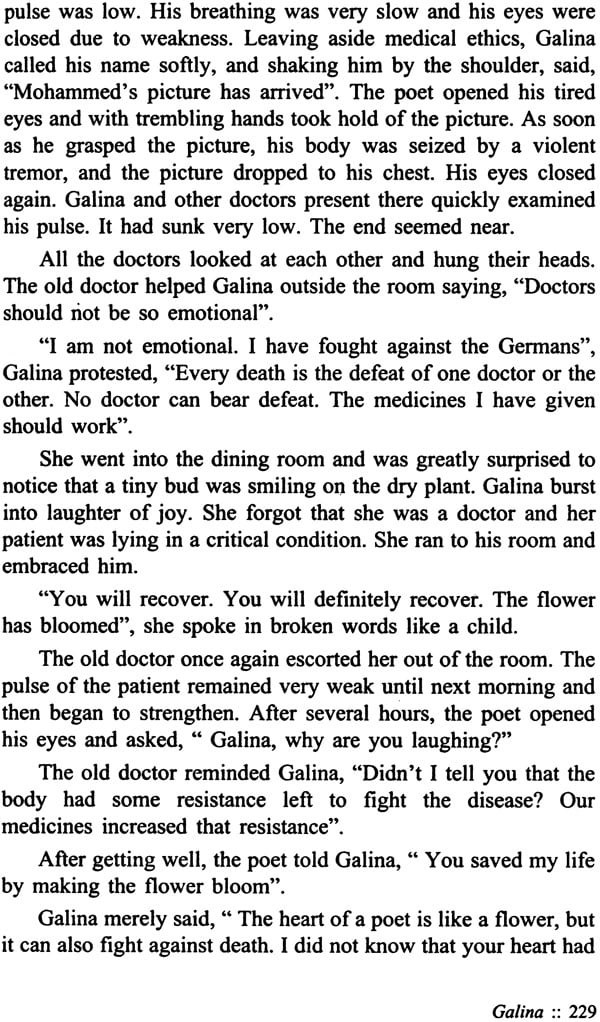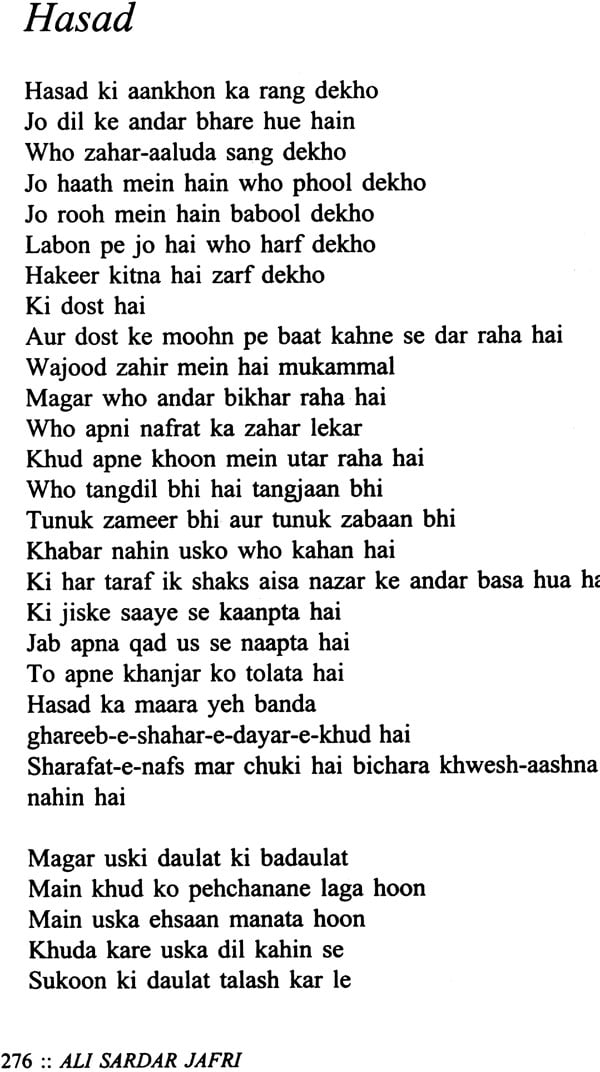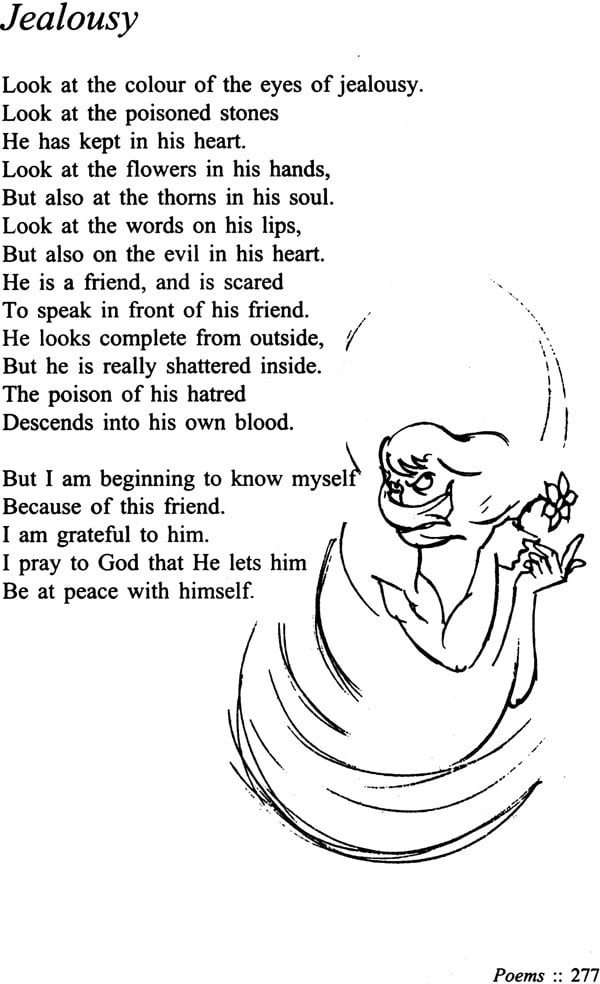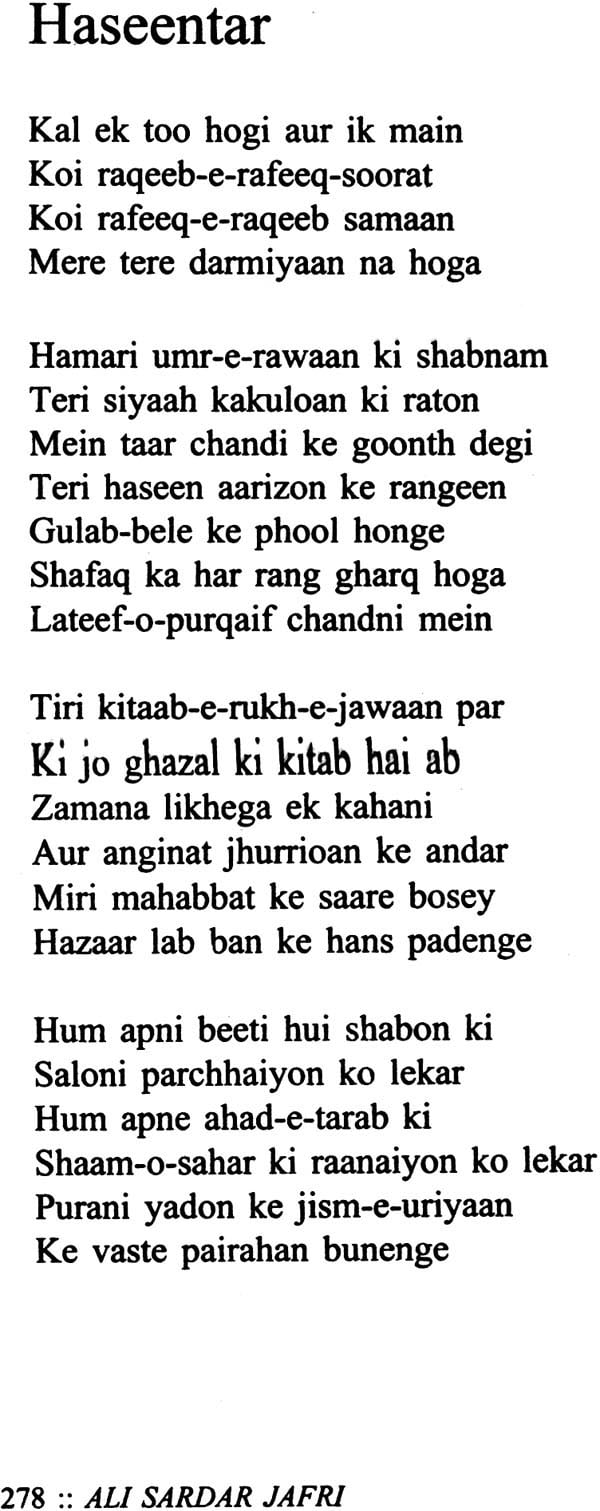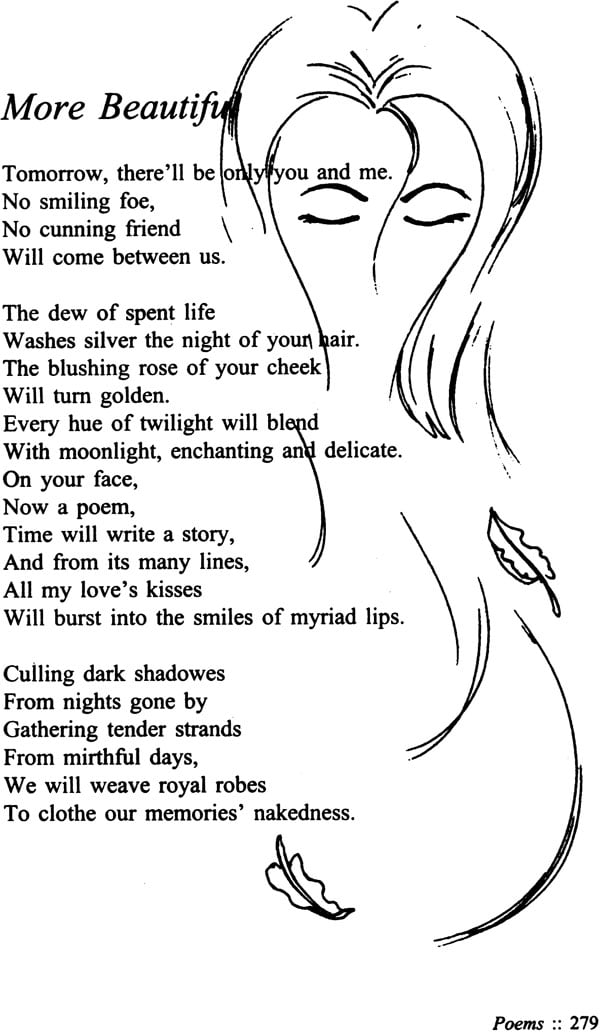
Ali Sardar Jafri (The Youthful Boatman of Joy)
Book Specification
| Item Code: | NAH350 |
| Author: | Squadron Leader Anil Sehgal |
| Publisher: | Bharatiya Jnanpith |
| Language: | English |
| Edition: | 2001 |
| ISBN: | 8126306718 |
| Pages: | 288 (Throughout B/W Illustrations) |
| Cover: | Hardcover |
| Other Details | 8.5 inch x 5.5 inch |
| Weight | 430 gm |
Book Description
This book is an important document on the poetry and personality of Ali Sardar Jafri, one of the most significant poets of the twentieth century.
Through the articles of distinguished poets, writers, political scientists, friends and admirers, the book successfully explains the charisma of Jafri’s magnetic personality, dynamic prose, eloquent oration and poetry of great social significance.
The book will acquaint the readers with a selection from Sardar Jafri ‘s vibrant poetry of powerful and poignant imagery.
The contributors include Jnanpith Award- winner Qurratulain Hyder, former Prime Minister of India I.K. Gujral, internationally acclaimed poet and Urdu scholar Professor Jagan Nath Azad, reputed Pakistani poet Ahmed Faraz, well-known Punjabi writer Kartar Singh Duggal, irrepressible columnist Khushwant Singh, political and social commentator Mushirul Hasan, comrade and senior most living progressive poet Kaifi Azmi, renowned poet and lyricist Javed Akhtar and film-artist and parliamentarian Shabana Azmi.
Dr. Mulk Raj Anand, internationally acclaimed Indian writer has written the Foreword to this book.
Edited by Squadron Leader Anil Sehgal, a close associate of Ali Sardar Jafri for over a quarter- century.
About the Author
Squadron Leader Anil Sehgal Born at Jammu Tawi, in Jammu & Kashmir State. Obtained Bachelor of Science from the University of Jammu & Kashmir, and Bachelor .ef Laws from the University of Jammu.
Published over 200 articles, in English, on diverse subjects in several leading periodicals of India.
Rotary International award to visit Finland. Edited a book of Hindi short stories under the aegis of Jammu & Kashmir Academy of Art, Culture and Languages.
Served for over two decades as a commissioned officer in the Indian Air Force.
Worked as Consultant to Zee Music and read a paper on folk music of Jammu & Kashmir at an international convention on music at Hong Kong.
Produced Sarhad, the first-ever music album on the poetry of Ali Sardar Jafri. Sarhad, dedicated to Indo-Pak amity, became a forerunner to Prime Minister Atal Behari Vajpayee’s historic ‘Lahore Bus Yatra’. Vajpayee presented Sarhad to his erstwhile Pakistani counterpart, during’ their historic summit at Lahore.
Harvard University, Boston, USA invited to their campus for a felicitation Ali Sardar Jafri, along with Anil Sehgal and Seema Anil Sehgal, the composer and singer of Sarhad.
Preface
Autumn of 1976. It was the initial period of my christening into the regimented life of the armed forces. I was posted at Air Force Station, Hindon, and was getting used to a lifestyle totally different from the bohemian life we were accustomed to, as students, in charming and stimulating atmosphere that prevailed, in the sixties and the seventies, in the state of Jammu and Kashmir.
I still missed the heated debates on issues political and literary, the long and unending evening walks with friends reciting the poems we had freshly read, long and inspiring rehearsals of the full-length plays I used to act in, broadcasting over Radio Kashmir which brought rather handsome pocket money along with recognition, writing for The Kashmir Times, Femina, Youth Times, Thought, The Hindustan Times and some other publications.
I would avail of every single opportunity to rush to Delhi, some 25 kilometres drive from Hindon, and watch a play or listen to a music concert; browse in the ever-enchanting bookstores or walk through the shadowed streets of New Delhi; visit libraries or simply enjoy a cup of piping hot coffee with friends.
During one such visit to New Delhi, I was sitting in a popular restaurant, in the Connaught Place, enjoying a cup of hot Cona coffee, and waiting for a friend.
A rather tall, lean, kurta-pajama clad figure, with long flowing salt-and-pepper hair, brushed straight back, entered the restaurant and sat somewhere in the middle, facing the door. He had an aura that compulsively invited attention. I felt I had seen him somewhere; the face appeared familiar. It took me a while to recognise him though. And the moment I did, I instantly rushed to him and introduced myself. He was the renowned poet, Ali Sardar Jafri, one of my favourites in Urdu poetry.
Those were the days we had only one Indian television channel, Doordarshan, and exposure of poets and literary personalities was very little on the visual medium. Therefore, recognition of poets like Jafri was limited, and dependent on their photographs printed in their books or a few mushairas that were telecast. We became friends.
Jafri was based in Bombay and I moved all over the country, thanks to the operational requirements of the Indian Air Force. We kept in touch through occasional exchange of letters.
I married Seema, a prominent singer from Jammu and Kashmir, in 1984. We share a common interest in music, literature, and poetry. Seema is daughter of a celebrated Sahitya Akademi award winning poet of Dogri language, Yash Sharma. She too was, and is, fond of Jafri’s poems.
In 1986, I was posted at New Delhi. This provided more opportunities to meet and interact with Jafri Sahib who was a frequent visitor to Delhi. These meetings brought us closer. He had heard Seema sing several times, especially, at the residence of Rais Mirza, a common friend of ours. He was much impressed with her voice, particularly her diction and feel for the nuances of Urdu poetry.
In 1991, I was posted to Bombay after a cardiac surgery. My recuperation was rather time consuming and afforded me few meetings with Jafri Sahib. But as I improved, these interactions also increased in number. Once, he especially recited a few poems for Seema and it was decided that she would set them to music. The bonds were cemented further.
As I look back, I realise our relationship with Jafri Sahib kept brewing over the years like vintage wine; each passing year added warmth, affection, glow, concern, and admiration.
Towards the end of 1996, I sought premature retirement from the Indian Air Force, and one of the first things I planned, was a music album on his poetry. Sifting through his poetry took some time and more delay resulted from my stints with Zee Music and Hindi films as a consultant. As we readied ourselves for the recordings, prestigious Jnanpith Award was bestowed on him.
Jnanpith Award added fuel to the fire of his ever-growing popularity and prestige in mushairas and seminars. Numerous felicitations were accorded to him through the length and breadth of the country, and even abroad. He was flitting through a hectic schedule of travels. Our recording was simply delayed.
I finally caught up with him, and proposed we record a music album dedicated to Indo-Pak amity, a subject equally dear to him, Seema and me.
He heard Seema sing his poems, free verses, dedicated to Indo-Pak friendship, tremendously liked the compositions, and readily agreed to record the poems selected by me. That gave birth to the first-ever music album dedicated to friendship between two warring nations.
He was not well when we started the recordings. Nevertheless, at the ripe age of 84, each day, he would religiously travel, from his residence in Kemps Corner to Andheri, a distance of some 25 kilometres, by local trains. I would then pick him up from the railway station and bring him to the studio. He brushed aside my suggestion that I could fetch him by car. A stickler for quality in everything he did, he never wanted me to take my attention away from the recordings. Despite his ill health, he would listen, like a critic and connoisseur, to each word sung by Seema; she was recording the first-ever music album on his poetry.
Foreword
After my association with the Left volunteer corps of those writers who joined resistance against Franco fascism in Spain, I came to India in 1937 to spread the campaign. Fascism was threatening to come to power in Europe, through Hitler, after it had already assumed control of Italy under Mussolini.
Both German and Italian fascists were helping General Franco against the democratic parties, which had won power in Spain under Roman leader La Passioner.
I had been in the group of British writers led by Ralph Fox who went to Spain with a Left group to fight against fascism, alongside the French and American writers. Andre Malraux and Earnest Hemingway had joined the Spanish resistance movement from France and the United States of America respectively.
After three months in the Spanish trenches I opted out and began to report the War, which was going against the Spanish left because of the vital help given to France by Mussolini’s fascism and Hitler’s storm- troopers.
I reported on the French warfare for three months for Bombay Chronicle in India and Daily Herald in Britain. Then I went back to London in early 1938 and decided to return to India to join campaign against fascism which had already been launched by a group of Left writers, in a conference, in 1936, which Munshi Prem Chand, the leading Hindi and Urdu writer, had presided over.
I stayed in Lucknow in Wazir Manzil, the big house of Syed Wazir Hassan, father of Sajjad Zaheer. It was heartening that Syed Wazir Hassan agreed to preside over ‘the Progressive Writers’ Conference, in Patna, in the autumn of 1938.
It was while we were preparing for the gathering in Bihar that one of the volunteers who helped was Ali Sardar Jafri who had recently emerged from the Delhi University after taking his B.A. degree.
During an informal meeting held in Patna whilst the young poet Majaaz recited his poem Aawara, Ali Sardar Jafri recited a poem by Mirza Ghalib against despair.
After the conference in Patna, the progressive writers’ group organised a conference in Calcutta, in the end of 1938. It was decided to request poet Rabindranath Tagore to preside over the Calcutta conference. Both Ali Sardar Jafri and I were asked to go and call on the great poet in Shantiniketan and invite him to maugurate the conference.
The old poet received us warmly and said his eyes did not permit him to come to Calcutta but he would give us an address he had written in praise of Mustafa Kamal as a revolutionary leader in Turkey who had upset the Caliphate and initiated new Turkish democracy.
We brought his address to Calcutta where Professor Hiren Mukherjee read it out in the first session of the Progressive Writers’ Conference.
Tagore’s words welcoming our progressive writers movement were to help bring most of the Bengali writers like Tara Shankar Banerjee, Vibhuti Banerjee and Manik Banerjee in the fold of Progressive Writers’ Movement (PWM).
On our return to Lucknow, Ali Sardar Jafri became an active assistant of Sajjad Zaheer, in lieu of which assistance Wazir Hassan and his wife did not charge any rent from him and fajaaz for the Zaheer house in which they stayed in the outer suburbs of Lucknow.
As volunteer of the Progressive Writers’ Movement, Sardar Jafri sold PWM books to the university students and helped to organize weekly meetings in the house of Dr Abdul Haleem, professor of Arabic in Lucknow university.
Contents
| The French Connection by Sultana Jafri | 32 |
| The Sardar of Urdu Poetry by Kuldeep Kumar | 39 |
| An Incorrigible Optimist by Khushwant Singh | 44 |
| A Class By Himself by Kartar Singh Duggal | 48 |
| A Great Humanist by Asghar Ali Engineer | 54 |
| Undisputed Leader of the Progressives by Baidar Bakht | 59 |
| A Rare Genius of National Resurgence by Rafiq Zakaria | 65 |
| People Like Sardar Don’t Die by Yavar Abbas | 69 |
| Of Eloquence, Refinement Commitment & Sardar Jafri by Mushirul Hasan | 74 |
| Eternally Positive, Eternally Optimist by Shabana Azmi | 79 |
| Sardar Jafri’s Poetry by Zahida Zaidi | 85 |
| Jafri Was An Institution by Javed Akhtar | 89 |
| Sardar Kahan Hai Mehfil Mein by Jagan Nath Azad | 92 |
| In Love With Poetry & Revolution by Inder Kumar Gujral | 97 |
| He Believed in Universal Brotherhood by Shovana Narayan | 106 |
| I spent more time earning than writing by Anindita Ramaswamy | 110 |
| A Poet’s Agony and Ecstasy by Vishnu Khare | 116 |
| There’s no conflict between being a Marnist & a poet by Behram Contractor | 120 |
| People Poet by Nirupama Dutt | 127 |
| Verse With A Vision by Saif Hyder Hasan | 0 |
| Taj Mahal of Urdu Literature by Kaifi Azmi | 136 |
| A Fragrant Breeze by Ahmed Faraz | 137 |
| Citation: Conferment of D. Litt. | 143 |
| Urdu : A Language Without Boundaries | 146 |
| Progressive Movement and Urdu Poetry | 159 |
| An Open Letter .. Hota Hai Shab-o-Roz Tamasha Mere Aage | 201 |
| My Slogan Is ‘Bread & Book’ | 209 |
| Sardar About Wife Sultana | 218 |
| Galina | 220 |
| Poems | |
| Guftagu | 234 |
| Tu Mujhe Itane Pyar Se Mat Dekh | 238 |
| Mera Safar | 240 |
| Tum Nahin Aaye The Jab | 246 |
| Subh-e-Farda | 248 |
| Nivala | 252 |
| Aabla-Pa | 254 |
| Tumhari Aankhen | 260 |
| Barhana Fakir | 266 |
| Pairahan-e-Sharar | 268 |
| Qatl-e-Aaftab | 270 |
| Harf-e-Bud | 274 |
| Hasad | 276 |
| Haseentar | 278 |
| Raj-Niraj | 282 |
| Jab Tira Naam Liya | 286 |
